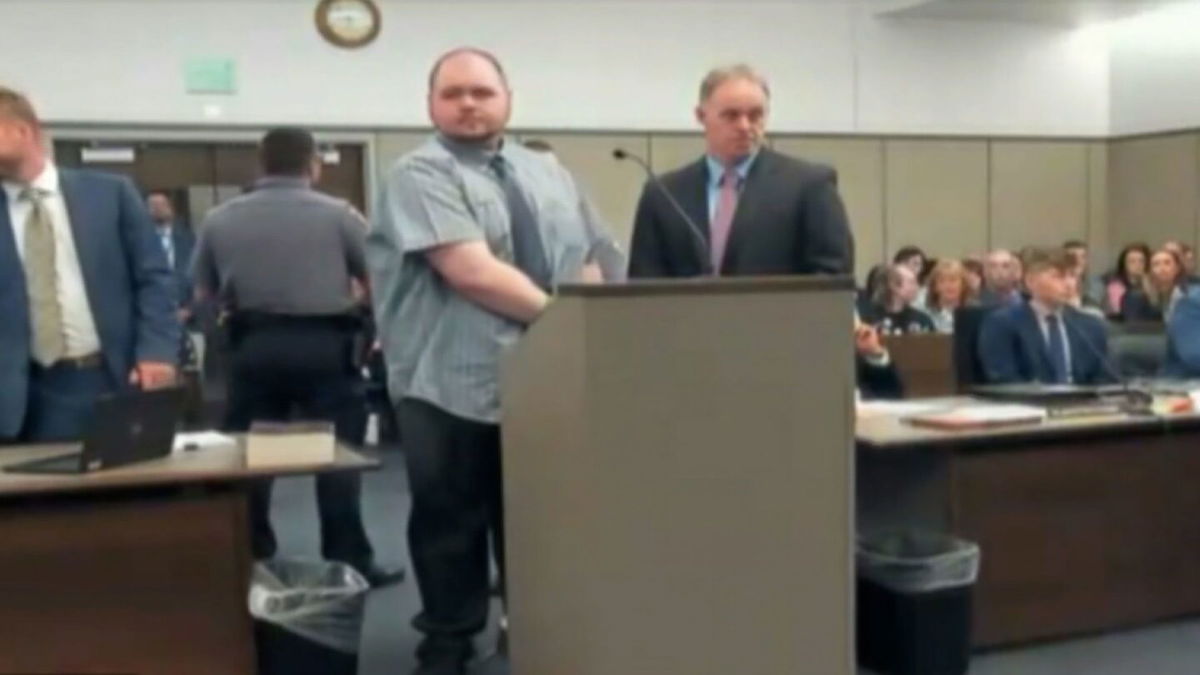Club Q shooter will plead guilty to 74 counts of federal hate and gun crimes, while prosecutors won’t seek death penalty

Anderson Lee Aldrich
By Andi Babineau and Jeremy Harlan, CNN
(CNN) — The person who pleaded guilty to state murder charges in a mass shooting at an LGBTQ+ nightclub in Colorado has reached a plea agreement on federal charges, court documents show.
As part of the proposed agreement, Anderson Lee Aldrich, 23, will plead guilty to 74 counts of federal hate crimes and gun crimes for the November 2022 massacre at Club Q in Colorado Springs that left five people dead, according to the documents.
They are expected to receive “multiple concurrent life sentences plus additional consecutive sentences totaling 190 years imprisonment,” upon a judge’s acceptance of the plea’s terms, the agreement says. Aldrich identifies as nonbinary and uses they/them pronouns.
In a news release announcing the agreement, the US Department of Justice called the attack “willful, deliberate, malicious and premediated,” and alleged it was committed “because of the actual or perceived sexual orientation and gender identity of any person.”
Aldrich is currently serving five consecutive life sentences plus an additional 2,208 consecutive years without the possibility of parole on the state charges at the Wyoming State Penitentiary. They pleaded guilty to five counts of first-degree murder and 46 counts of attempted murder in June.
The agreement stipulates the United States will not seek the death penalty against Aldrich and the proposed sentence “is sufficient but not greater than necessary” for justice in the case.
Both parties are requesting a change of plea hearing with an immediate sentencing to avoid repeatedly transferring Aldrich between state and federal custody and creating an undue burden on law enforcement personnel, victims and family members, and Aldrich themself.
The US Attorney’s Office declined CNN’s request for comment on the plea agreement. CNN has also reached out to Aldrich’s federal public defender for comment.
Heroes saved lives, authorities said in 2022
On November 19, 2022, Aldrich began shooting at the dozens of people in Club Q before being subdued by two “heroic” patrons who police credit for preventing even more tragedy.
The shooter brought an AR-style weapon and a handgun to Club Q, but mainly used the assault-style rifle to carry out the massacre, Colorado Springs’ police chief said in 2022.
The victims – Daniel Aston, Raymond Green Vance, Kelly Loving, Derrick Rump and Ashley Paugh – were either employees or patrons at Club Q, which attracted customers from different backgrounds and orientations.
The nightclub was long considered a safe haven for the LGBTQ+ community in a city with a history of being anti-gay.
The massacre at the beloved venue evoked memories of the 2016 Pulse nightclub shooting in Orlando, Florida, which left 49 people dead.
Federal prosecutors rarely seek death penalty since Biden election
The decision to not seek the federal death penalty comes less than a week after prosecutors in New York announced they will ask for the accused Buffalo, New York, supermarket gunman to face the possibility of capital punishment.
It is the first time the Justice Department under President Joe Biden has authorized pursuit of the death penalty.
The 20-year-old gunman is facing several hate crimes and firearms charges in the shooting where he killed 10 Black people. He already is serving a life sentence after pleading guilty last year to New York state terrorism and murder charges. His lawyers had said in court their client would be willing to plead guilty to the federal counts if prosecutors agreed not to pursue the death penalty.
Advocates of abolishing the death penalty say Biden’s Justice Department has a mixed record on capital punishment.
In 2021, Attorney General Merrick Garland issued a moratorium on federal executions, which is still in place. Garland has deauthorized 26 death penalty cases involving 32 defendants started under previous administrations, according to department statistics, and the Justice Department had not authorized any new capital cases since he took over in 2021.
Federal prosecutors under Garland have, however, taken two death penalty cases authorized before 2021 to trial. Garland’s decision in the Buffalo case merely authorizes prosecutors to seek the death penalty. Ultimately, the decision is up to the jury and a judge.
It isn’t uncommon for democratic administrations to pursue the death penalty. Under former President Barack Obama, Attorney General Eric Holder authorized the department to seek the death penalty in 39 cases, and his successor, Loretta Lynch, authorized five capital cases.
The-CNN-Wire
™ & © 2024 Cable News Network, Inc., a Warner Bros. Discovery Company. All rights reserved.
This is a developing story and will be updated.
CNN’s Hannah Rabinowitz, Artemis Moshtaghian, Ray Sanchez Andi Babineau, Holly Yan and Christina Maxouris contributed to this report